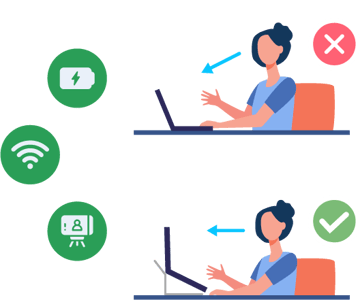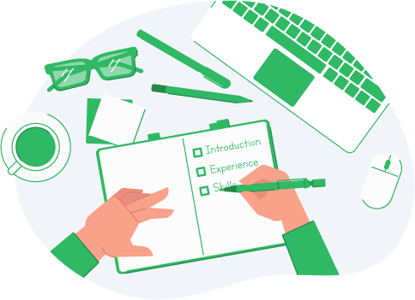Here are some quick tips to record a successful one-way-interview for hiring managers to see
One of the most important parts of your Simera Simera candidate profile is your one-way video interview. This video serves as a presentation for recruiters and hiring managers to see and plays a key role to be selected for a job. The better an interview is, the higher the chances are of being hired.
Here are some recommendations to keep in mind before recording the interview:
1) Prepare your environment
The first step is to prepare where you will record your interview, it should be done in a room with proper lighting and where you can have privacy. Remember to close the door to avoid any unwanted noises. Make sure that you have a proper background during the interview, it is recommended to have a solid colored wall. If you don’t have one, a virtual background can be used instead. Keep in mind that the background should not be too flashy, viewers should be able to focus on you and not the background.
2) Have your interview equipment ready
Another key factor is to have your equipment necessary for the interview ready, by that we mean the device you will use to log into the interview.
First, find the best angle and height at which to place your computer or phone. If you are using your phone be sure to place it horizontally to present a better view of yourself and on a stable surface or phone stand to avoid any unwanted movements.
Check that your internet connection is stable and that your computer or phone are fully charged to record your interview. If your device runs out of battery you will not be able to finish your interview. If your internet connection is unstable, parts of your interview could be lost or partially recorded, so make sure to have everything ready before you start. Have your phone or computer plugged in as an extra precaution during the interview.
3) Prepare your script and wording
During an interview, you might feel nervous, have a mind block or not know what to say. To prevent this from happening it is
recommended to write a script or outline ahead of time. Think of your skills, your achievements and your experience. Your interview should also have a basic structure like this:
Introduction
Always remember to present yourself to a recruiter or hiring manager. Say your name, country, and career, remember, this is just a quick introduction.
Work Experience
Talk about your work experience or projects. Mentioning where you have worked or projects you have been assigned to will give recruiters a better picture of your knowledge and your skills.
Strengths, Skills and Achievements
This is a core section, here you must let recruiters and hiring managers know what makes you a great candidate, what skills you have, what projects or achievements in your past work make you proud, what makes you a great professional and what you can bring of value to any company. Be sure to highlight them all.
Closing Statement
You should always have closure during a one-way interview. Since you don’t have a recruiting manager to say goodbye or call the meeting to an end, you should close the interview on your own. To finish you can use phrases like thank you for your time or looking forward to working with you soon.
 4) Dress Code and Body Language
4) Dress Code and Body Language
Remember that Simera’s One-Way interview is the same as if you were going to an on-site one with your future boss or hiring manager, so you must dress accordingly. That means you should wear formal clothing and avoid pajamas, loungewear and messy hair.
When recording, keep in mind your body language, always look at the camera, this would be the equivalent of maintaining eye contact during an on site interview. Remember to smile and talk naturally, never read a document during your interview as this will be noticed by recruiters and can give your body language and speech a “robotic” feel.
If necessary, practice your speech and body language in front of a mirror first, this will help you relax and be more confident when in front of the camera. Talk clearly and at a moderate speed to make sure you are understood.
By now you should be ready to start setting up all that you need for a successful interview, remember to be relaxed and professional.
-1.png?height=120&name=Official%20Simera%20Logo%20(1)-1.png)


